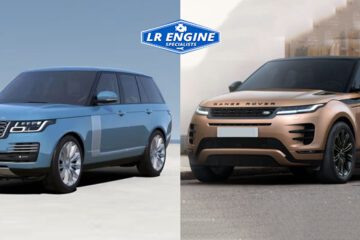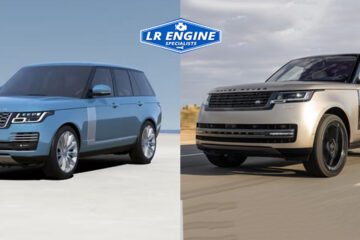When opting between a Range Rover Supercharged Engine vs a Range Rover Turbocharged Engine, understanding the long-term maintenance necessities is vital. Both engine types have their pros and cons, specifically in terms of performance, reliability, and upkeep. Whether you own a petrol or diesel Range Rover, knowing which engine requires less maintenance can help you make a knowledgeable decision and reduce unexpected repair costs over time.
Understanding the Range Rover Supercharged Engine
The Range Rover Supercharged Engine is built for high-performance enthusiasts. This engine depends on a mechanically driven supercharger that forces more air into the combustion chamber, resulting in immediate power delivery. A supercharged engine responds quickly to throttle input, unlike a turbocharger, which takes time to spool up, making it perfect for those who want rapid acceleration. Supercharged engines in Range Rovers are often found in models such as the Range Rover Sport Supercharged and the Range Rover SVAutobiography. These vehicles have incredible horsepower and torque, offering thrilling driving experiences. However, when it comes to Range Rover Supercharged Engine Maintenance, various factors influence how often and how extensively it needs servicing.
Understanding the Range Rover Turbocharged Engine
On the other hand, a Range Rover Turbocharged Engine uses a turbine-driven forced induction system that compresses air to enhance efficiency and power. Turbocharged engines are well-known for their fuel efficiency and ability to deliver more power from smaller engine sizes. Unlike superchargers, turbochargers rely on exhaust gases to spin the turbine, which means there is often a little delay before peak performance kicks in.
Turbocharged engines are generally found in Range Rover Diesel Variants and certain petrol models, providing a balance between power and fuel economy. These engines offer exemplary efficiency but require unique maintenance compared to supercharged versions.
Comparing Maintenance: Supercharged vs Turbocharged
Oil and Lubrication System Maintenance
One of the main aspects of Range Rover Supercharged Engine vs Range Rover Turbocharged Engine Maintenance is the oil and lubrication system. Supercharged engines need high-quality synthetic oils due to their constant mechanical operation. Because the supercharger is belt-driven and works at all times, oil changes should be frequent to ensure excellent lubrication.
Turbocharged engines, on the other hand, produce extreme heat due to high-pressure exhaust gases. This means the oil can degrade faster, resulting in potential carbon buildup in the turbo system. Turbocharged engines also require good-quality oils, but they may be more prone to sludge accumulation, making regular oil changes even more essential.
Wear and Tear on Engine Components
The design of a supercharged engine is relatively simple since it includes fewer complex parts than a turbocharged engine. However, since the supercharger runs continuously, it puts additional stress on the engine, resulting in higher wear and tear over time. Components like the supercharger belt and bearings may need constant replacement.
In comparison, a turbocharged engine depends on intricate parts such as the turbocharger, intercooler, and wastegate. While these components boost performance, they are vulnerable to failures due to extreme heat and high-speed operation. Turbocharger failure is one of the most common maintenance problems, often requiring expensive repairs or replacements.
Reliability and Long-Term Performance
When it comes to reliability, supercharged engines tend to be more potent in the long run because they do not depend on high-pressure exhaust gases. Since the supercharger is mechanically powered, there is less possibility of overheating issues compared to turbocharged systems. However, supercharged engines may need more frequent maintenance of belts and pulleys.
Turbocharged engines deliver excellent efficiency, but they may also face drawbacks like turbo lag, oil coking, and intercooler leaks. Regular servicing is essential to keep the turbo in good condition, and failure to do so can lead to expensive repairs.
Fuel Efficiency and Running Costs
In terms of fuel efficiency, turbocharged engines normally outperform supercharged ones. By increasing power from a smaller engine, turbocharged Range Rovers improve fuel efficiency, making them a smart choice for economical driving. However, turbocharged engines need high-octane fuel to prevent knocking and ensure effortless operation.
Supercharged engines, while potent, tend to consume more fuel due to their continuous power delivery. If fuel economy is a main concern, turbocharged models might be a better choice.
Common Maintenance Issues for Supercharged Engines
>> Supercharger Belt Wear: Since the belt-driven system operates persistently, it needs periodic examination and replacement.
>> Increased Engine Load: The continuous operation of the supercharger puts stress on the engine, requiring powerful cooling and routine oil changes.
>> Potential Pulley Issues: Over time, the pulleys and bearings may wear out, requiring maintenance.
Common Maintenance Issues for Turbocharged Engines
>> Turbocharger Failure: Too much heat and high-speed rotation can result in turbo failure, requiring expensive replacements.
>> Oil Coking and Sludge Buildup: High temperatures can lead to oil breaking down, resulting in blockages in the turbo system.
>> Intercooler Leaks: Since turbochargers depend on compressed air, leaks in the intercooler system can minimize efficiency and performance.
Which Engine Requires Less Maintenance?
When comparing Range Rover Supercharged Engine vs Range Rover Turbocharged Engine Maintenance, the supercharged engine typically requires less overall upkeep in terms of intricate repairs. While superchargers need regular belt and pulley maintenance, turbocharged engines are more prone to high-temperature failures, turbo lag issues, and intercooler problems.
However, turbocharged engines can be more affordable in terms of fuel consumption, making them a better choice for drivers who prioritize efficiency over outright power.
Final Verdict
If you are considering an engine that provides immediate power delivery with fewer complex components, the Range Rover Supercharged Engine is the better option for long-term maintenance ease. However, if you value better fuel efficiency with slightly higher maintenance requirements, the Range Rover Turbocharged Engine is a viable choice.
No matter which engine you select, proper maintenance is vital to extending its lifespan and ensuring exemplary performance. Regular oil changes, timely examinations, and using high-quality parts can remarkably reduce potential repair costs.
Keep your Range Rover engine in desirable condition with LR Engine Specialists. Our expert team provides top-quality maintenance, servicing, and repairs to keep you on the road with confidence.
FAQs:
Which Range Rover engine lasts longer, supercharged or turbocharged?
Supercharged engines often last longer due to their simpler mechanics, but regular belt and pulley maintenance is essential.
Are turbocharged engines more fuel-efficient than supercharged ones?
Yes, turbocharged engines normally provide better fuel economy by extracting more power from smaller engine sizes.
What is the most common maintenance issue with a supercharged engine?
Supercharger belt wear is the most common issue, requiring periodic examinations and replacements.
Do turbocharged engines need more frequent oil changes?
Yes, due to high operating temperatures, turbocharged engines are more prone to oil degradation and sludge buildup.
Which engine type is more expensive to repair?
Turbocharged engines can be more expensive to repair due to potential turbo failures, intercooler leaks, and oil-coking problems.


